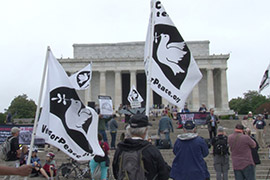- Slug: BC-CNS-Veteran Washington,620
- Interactive chart available (embed code below)
- Photos, video story available (thumbnail, caption below)
By EMMA LOCKHART
Cronkite News
WASHINGTON – Since taking office in January, members of Congress have introduced nine separate pieces of legislation that deal with when and how the president should be allowed to use military force against terrorist groups abroad.
But if they are ever asked to vote on any of those bills, most lawmakers will be doing so without the benefit of military experience themselves. The number of veterans serving in this Congress is at its lowest level in more than 75 years, a lack of history that gives some veterans groups pause – and causes others to shrug.
“Whether you’ve served for four years or 40 years, you bring a different perspective into the halls of Congress. And it’s a voice that needs to be heard if we are sending our sons and daughters into harm’s way,” said Joe Davis, national spokesman for the Veterans of Foreign Wars.
According to data from the historical offices for the Senate and House of Representatives, there are 19 senators and 80 House members in the current Congress with military experience, a rate of 18.5 percent.
Veterans today account for fewer than one in five members of Congress, down sharply from the peak of 1971-72, when 389 veterans who held office made up 72.7 percent of Congress.
This year’s numbers are the lowest since 1943-44, the earliest year for which numbers were readily available from the historical office, when there were 197 members who had military service.
Veterans still make up more of Congress than the U.S. overall, where one expert said they account for about 7 percent of the general population. But that lack of military experience in elected office is still an issue for William Hubbard, the vice president of government affairs for Student Veterans of America.
“It’s difficult for them (lawmakers) to understand on a policy level necessarily what is required to support those who have spent time in the military,” Hubbard said. “It’s such a nuanced experience and impacts now such a small portion of our country.”
But not everyone is convinced the military experience is a benefit for members of Congress.
Army veteran Ben Tweedie, who was in Washington this week for a Veterans for Peace Rally, points to Arizona Sen. John McCain, a “prisoner of war, yet one of the biggest war hawks out there right now.”
McCain, who served in Vietnam, is one of three veterans in Arizona’s 11-member congressional delegation, along Rep. Martha McSally, R-Tucson, who served in Afghanistan, and Rep. Ruben Gallego, D-Phoenix, an Iraq War veteran. That 27 percent representation in the delegation puts Arizona slightly ahead of Congress as a whole.
Tim Spoehr, the director of national defense at The Heritage Foundation, thinks military experience is beneficial in Congress.
“They lack probably a good understanding of what the military is like, and the decision to commit U.S. forces into combat,” Spoehr said. “It would be helpful if they had military (experience) to better understand those factors.”
Spoehr says the biggest reason for the decrease in veterans in Congress is the same as for the rest of the country: Simply not as many people serve anymore.
“In the past, because of World War II and large wars like Korea, there were many more veterans in the U.S. population. Today the average is 7 percent of the U.S. population have served in the military,” he said.
Whether lawmakers have served or not, Tweedie said he hopes they steer the country in a peaceful direction.
“I do think that anyone who does serve in office, of a country who claims to support freedom, support prosperity, needs to have an understanding of the horrors of war,” he said at the rally Tuesday outside the White House.
^__=
Web links:
_ Veterans in the House: https://veterans.house.gov/resources-for-veterans/veterans-in-congress.htm
_ Military service chart embed code: <script id=”infogram_0_veterans_in_congress_1947_2017″ title=”Veterans in Congress 1947-2017″ src=”//e.infogr.am/js/dist/embed.js?Rzf” type=”text/javascript”></script>
^__=
A group called Veterans for Peace rallies in Washington this week against U.S. military actions overseas. Congress is taking up the question of authorizing such actions, but does so with the fewest number of military veterans in office in decades. (Photo by Emma Lockhart/Cronkite News)
